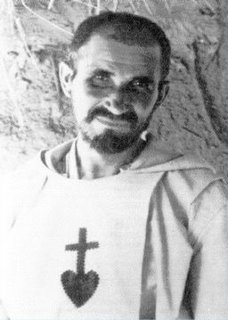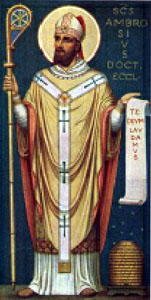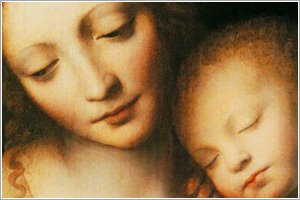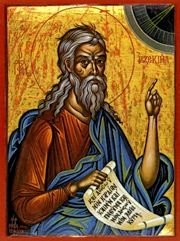It has been a hot-button issue for some time now: should the Holy See waive the centuries old discipline of celibacy for those to be ordained as priests within the Latin Rite of the Catholic Church? Many bring this question up because they believe that it might encourage more men to step forward for priestly ordination and thus alleviating the current priest shortage that is dramatically effecting so many parishes in the United States.
There are many ways to tackle this issue. First, we should ask—is there any biblical evidence that celibacy is of any spiritual value?
Celibacy in the Bible (all citations from the NAB)
Isaiah 56:3-5: Let not the foreigner say, when he would join himself to the LORD, "The LORD will surely exclude me from his people"; Nor let the eunuch say, "See, I am a dry tree." For thus says the LORD: To the eunuchs who observe my sabbaths and choose what pleases me and hold fast to my covenant, I will give, in my house and within my walls, a monument and a name Better than sons and daughters; an eternal, imperishable name will I give them.
The
New Jerome Biblical Commentary (a modern historical-critical commentary) has the following note for this verse: “Eunuchs: Such were refused admission “into the assembly of the Lord” (Lev. 22:24; Deut 23:2), because it seemed improper for a person, deprived of the power of transmitting life, to associate with the God of life. Some Israelites were castrated for working within the harem of Israelite or foreign kings (1 Sam 8:15; etc.). Trito-Isaiah urges their full readmission among God’s people (Wis. 3:14). Their contribution to Israel’s vibrant religious life will be their ‘monument and name,’…”
This same
Commentary states that Isaiah 56 here gives the Old Testament background for Jesus’ key remark concerning celibacy “for the kingdom” as well as other important New Testament references to celibacy:
Matthew 19:9-12 (NAB): I say to you, whoever divorces his wife (unless the marriage is unlawful) and marries another commits adultery." [His] disciples said to him, "If that is the case of a man with his wife, it is better not to marry." He answered, "Not all can accept [this] word, but only those to whom that is granted. Some are incapable of marriage because they were born so; some, because they were made so by others; some, because they have renounced marriage for the sake of the kingdom of heaven. Whoever can accept this ought to accept it."
If celibacy were somehow against God’s will—why would the Son of God, God incarnate, live his earthly life as a celibate?
Some critics of the Church’s discipline will point to the fact that Peter (the first “Pope”!) was (gasp!) … married (citing references to Peter’s “mother-in-law”, Mark 1:30)! Perhaps they forget that Peter—speaking for all of the apostles—also makes a reference to an act of renunciation—the renunciation of possessions. In His reply, Jesus also relates the renunciation of a “wife” to the general call of abandonment for the Gospel (I include a few preceding verses for context):
Luke 18:29-30 (NAB): For it is easier for a camel to pass through the eye of a needle than for a rich person to enter the kingdom of God." Those who heard this said, "Then who can be saved?" And he said, "What is impossible for human beings is possible for God." Then Peter said, "We have given up our possessions and followed you." He said to them, "Amen, I say to you, there is no one who has given up house or wife or brothers or parents or children for the sake of the kingdom of God who will not receive (back) an overabundant return in this present age and eternal life in the age to come."
Even if Peter did not choose to leave his family in order to follow Jesus (he could have been a widower), still at some point, he had to make a break with wife and family in order to travel with Jesus, take upon the responsibility of the chief apostle, and eventually (as tradition tells us) be martyred.
Further on in Matthew 19 we learn that renunciation leads to a divine reward—including eternal life:
Matthew 19:27-30: Then Peter said to him in reply, "We have given up everything and followed you. What will there be for us?" Jesus said to them, "Amen, I say to you that you who have followed me, in the new age, when the Son of Man is seated on his throne of glory, will yourselves sit on twelve thrones, judging the twelve tribes of Israel.
And everyone who has given up houses or brothers or sisters or father or mother or children or lands for the sake of my name will receive a hundred times more, and will inherit eternal life.
And this seems to relate to the fact that we are called to place the supernatural love of Christ above the natural loves for family, etc.:
Matthew 10:37-38: "Whoever loves father or mother more than me is not worthy of me, and whoever loves son or daughter more than me is not worthy of me; and whoever does not take up his cross and follow after me is not worthy of me.
The beauty of virginity and celibacy is that it more perfectly anticipates what life will be like in heaven. In heaven, we will not “marry nor [be] given in marriage”. Why is that? Because marriage is a sacrament that is supposed to symbolize the union between Christ and the Church. It is a sacrament that is supposed to give a man and a woman the grace to be configured to Jesus Christ and grow in intimacy with God through their mutual love for one another and for their children. When we are before God in heaven… there will be no need for sacraments because we will be in the presence of God himself!:
Matthew 22:30: Now at the resurrection, of the seven, whose wife will she be? For they all had been married to her." Jesus said to them in reply, "You are misled because you do not know the scriptures or the power of God. At the resurrection they neither marry nor are given in marriage but are like the angels in heaven.
Other key passages in the New Testament related to celibacy:
Matthew 8:20-22: some disciples are called to follow Christ just as He tread the earth in ministry—with “nowhere to lay his head.”
And the great St. Paul—himself apparently a celibate—gives perhaps the most complete endorsement of celibacy as a prime way to serve the Kingdom:
1 Corinthians 7:17, 25-35: Only, everyone should live as the Lord has assigned, just as God called each one. I give this order in all the churches. … Now in regard to virgins, I have no commandment from the Lord, but I give my opinion as one who by the Lord's mercy is trustworthy. So this is what I think best because of the present distress: that it is a good thing for a person to remain as he is. Are you bound to a wife? Do not seek a separation. Are you free of a wife? Then do not look for a wife. If you marry, however, you do not sin, nor does an unmarried woman sin if she marries; but such people will experience affliction in their earthly life, and I would like to spare you that. I tell you, brothers, the time is running out. From now on, let those having wives act as not having them, those weeping as not weeping, those rejoicing as not rejoicing, those buying as not owning, those using the world as not using it fully. For the world in its present form is passing away. I should like you to be free of anxieties. An unmarried man is anxious about the things of the Lord, how he may please the Lord. But a married man is anxious about the things of the world, how he may please his wife, and he is divided. An unmarried woman or a virgin is anxious about the things of the Lord, so that she may be holy in both body and spirit. A married woman, on the other hand, is anxious about the things of the world, how she may please her husband. I am telling you this for your own benefit, not to impose a restraint upon you, but for the sake of propriety and adherence to the Lord without distraction.
In short, celibacy is not natural—rather, it is “
supernatural.” To live a life of consecrated celibacy is to live a life in imitation of Jesus, a life which requires reliance upon God’s grace. Celibacy is the offering of something good—marriage—to God as a gift… an act of renunciation so that a man can serve the kingdom in a unique and demanding way… and also so that he can attain a certain intimate union with Christ. Celibacy in no way denigrates marriage.
Holy matrimony is also a demanding and beautiful sacrament. The Church, in her wisdom, has determined that the norm for the Latin rite is that only celibate men would be ordained to the priesthood. There are exceptions of course: married clergymen who convert from the Anglican or Lutheran communities have been admitted to holy orders in some cases. I have known a few of such priests and they are outstanding! However, the wisdom of the Church has seen that the discipline of mandatory celibacy as the norm better serves the needs of the Church.
This is a discipline—not a doctrine. It could be changed. However, a change does not seem imminent at this time. We must also question what difference such a change would make in the pastoral ministry of priests and also the number of priestly ordinations. For my part, I will continue to trust Holy Mother Church. She knows best!
LinksFor more
apologetic articles defending priestly celibacy (including answers to objections that some anti-Catholics find in the Bible [Gen 1:28; 1 Cor 7:2; 1 Tim 3:2, 4-5) see the following link:
http://www.catholic.com/library/Celibacy_and_the_Priesthood.aspAn article from
Fr. Cantalamessa, preacher to the papal household, “Virginity, a Positive Approach to Celibacy”:
http://www.wf-f.org/03-4-Virginity.htmlFor coverage of the sad
Archbishop Milingo affair [the recently excommunicated Archbishop of the Zambian capital of Lusaka who has been ordaining married men to the priesthood], see:
http://www.catholicnewsagency.com/new.php?n=8246http://www.catholicnewsagency.com/new.php?n=7693http://fatherjoe.wordpress.com/2006/07/13/archbishop-milingo-schism-over-married-priests/Labels: apologetics, priesthood, religious life, Sacred Scripture






